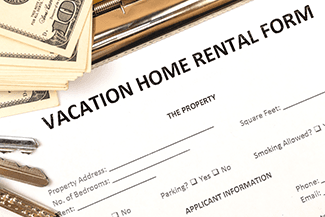Short-term rentals are the rage these days. They have become a driving force in our housing market.
The vacation rental market has exploded onto the real estate scene over the last several years. According to Apartments.com, there are over 5,237 short-term rentals in Phoenix alone, and Tucson lists 1,138 as of October 24, 2022.
If you are thinking about jumping into the vacation rental market, here is what you will need to know before you post your property for rent.
What Is A Short-Term Rental?
 The short-term rental, also known as a vacation rental, is usually a single-family home or apartment that is rented out for less than 30 days, though there is no “hard” number of days. Some are rented for more than a month, especially during the winter visitor season. The homes are usually located in an area that supports tourism and have nearby attractions. If your property fits the bill, hold on, there are a few things you should know before turning your property into a short-term rental.
The short-term rental, also known as a vacation rental, is usually a single-family home or apartment that is rented out for less than 30 days, though there is no “hard” number of days. Some are rented for more than a month, especially during the winter visitor season. The homes are usually located in an area that supports tourism and have nearby attractions. If your property fits the bill, hold on, there are a few things you should know before turning your property into a short-term rental.
What Would Be Expected Of Me, The Landlord?
The landlord, which is you, will need to take several issues into account.
Check the market your property is located in. How many short-term rentals are there, and what are they charging?
What are the costs for supplies such as towels, paper products, cleaning supplies, and ongoing maintenance? As the landlord, you, or someone you designate will need to clean the rental after each renter leaves. If you live far away from your vacation rental, there will be the expense of hiring someone to do it for you. Therefore, you may want to consider charging a cleaning fee to help recoup this cost. Utility bills, including trash removal services, will also play into your calculations.
So, keeping the place up and paying the bills is about it, right? Wrong! There are rules, and you will want to stick to them.
The Rules
 Every state has some rules regarding short-term rentals.
Every state has some rules regarding short-term rentals.
This past session, the Arizona State Legislature passed a bill that outlines what state, county, and local municipalities can and cannot do regarding restricting short-term rentals.
HB 2672, also dubbed the “Party House” law, does not allow restrictions by any governmental entity on short-term rentals where zoning for residential use is allowed. Some exceptions and rules are imposed, usually by the local government jurisdiction.
- If you are the owner, you must designate a locally available representative who can respond in a reasonable amount of time to any complaints that might be made 24/7. The designated person must provide contact information.
- You may have to register your rental with the local governing body.
- You may be required to obtain a permit and pay sales tax on rental income.
- You may not be able to hold specific events.
- You may be limited to the number of people that can stay in the rental.
- Local governing entities may also limit use based on the “health, safety, and welfare” of the community. Building codes and sanitation may also limit your use.
Because jurisdictions vary, you will have to check with the jurisdiction you are looking to invest in before you buy a property or turn your existing home into a short-term rental.
Some jurisdictions will require you to notify neighbors of your plans to have a short-term rental. Even if they don’t, that is a good idea and the neighborly thing to do. There can be problems with renters, such as loud parties and raucous behavior. This can be a BIG issue. By meeting your neighbors and talking with them about how you plan to mitigate the bad behavior of renters, you will have taken the first solid step. Give them your cell phone number so they can call you before they call the police.
HOA’s
Homeowners Associations may have rules of their own. The Covenants, Conditions, and Restrictions, (CCRs) of any given subdivision will vary from place to place. The law that prevents Arizona governmental jurisdictions from implementing laws to prevent short-term rentals does not necessarily apply to HOAs. Recent Arizona Supreme Court decisions have set a guide. In an opinion by Superior Court Justice Janet C. Bostick of Pima County, “HOAs can only amend CCRs if the circumstances driving the amendment “is contained and foreseeable from the original (rules).”
This means you better check the HOA and CCRs to determine if the ability to use your property for a short-term rental is possible. You sure want to avoid any legal hassles.
Are Short-Term Rentals Worth It?

That all depends on where it is. Remember the three rules of Real Estate: Location, Location, Location!
The market you are in will dictate how much you can get for rent and at the time of year. When the Super Bowl was in Glendale, some homes went for thousands of dollars just for a few nights. Crazy, right?
Typically, if you are purchasing a second home, and don’t plan on spending all your time there, short-term rentals may be a great way to offset the cost of keeping the home. A purchased home, to rent, has the potential of yielding a higher return on investment than a long-term rental.
We talked with a short-term rental owner to find out some of the operational aspects you will need to be aware of. For starters, Sandy (last name withheld), suggests reviewing all the different rental agencies out there. They run the gamut for handling everything from marketing, booking, and monitoring, down to changing the linens (for a hefty fee), and helping you run your own show. Each owner needs to determine their personal level of comfort, investigate the different companies’ services, and then move forward.
Vetting the renters is a big deal for some owners as well as having the ability to monitor the coming and going of guests. Sandy uses the Ring doorbell system. She is adamant that on your website, (oh yes, you will need one of those), you are up-front and transparent about ANY monitoring system.

If you are duped and a party group rents, you run the risk of damage to your investment. You may also want to require a security deposit if it is allowed in your jurisdiction. There are ways to recoup costs for damage in addition to the security deposit, but who wants that hassle? Companies that manage properties may have a built-in vetting process. You will need to verify how they go about the vetting.
The crux of this endeavor , as Rosie always says, is planning! Research the support provided by the different companies. There are dozens of companies, each with different levels of service and different fee structures.
This form of investment can be quite lucrative, but you can also lose your shirt if you are not careful. You must go into this with your eyes wide open. Like any project you might undertake, planning is key!
###
PODCAST
The vacation rental market has exploded on the real estate scene over the last several years. If you’re thinking about making your property a short term rental, you must know the steps to follow to avoid problems and violations. What’s expected from you as a landlord, the jurisdictions in your city, avoiding complaints from neighbors and the HOA rules on short term rentals.
Podcast Archive With Expanded Content and Resources
PHOTO CREDIT
- Shutterstock


















